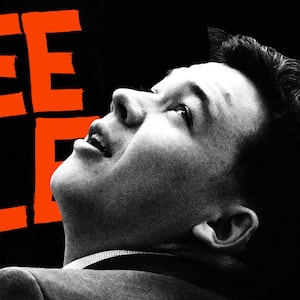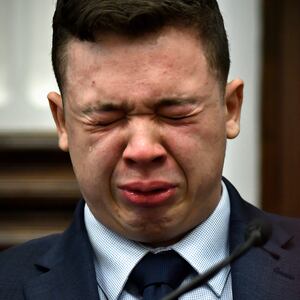A misdemeanor gun charge against Kyle Rittenhouse was dismissed just hours before jurors were expected to begin deliberating the fate of the teenager accused of murdering two people and trying to kill a third during a police-violence protest last August.
Hours later, prosecutors made a last-ditch attempt to convince jurors he belonged in prison.
During closing arguments, Assistant District Attorney Thomas Binger tried to convince jurors that Rittenhouse was a teen gunman with no “legal authority” nor the “honor” to take lives. The defense has argued throughout the trial that Rittenhouse acted in self-defense.
“You cannot claim self-defense against a danger you create. That’s critical right here. If you’re the one who is threatening others, you lose the right to claim self-defense,” Binger argued on Monday.
Rittenhouse, 18, has faced a slew of charges, including first-degree reckless homicide, in relation to the Aug. 25, 2020, shooting amid unrest in Kenosha, Wisconsin, over the police shooting of Jacob Blake. During two incidents caught on camera, Rittenhouse fired an AR-15 and killed 36-year-old Joseph Rosenbaum and 26-year-old Anthony Huber. He also severely wounded Gaige Grosskreutz, now 27.
“After killing Anthony Huber, after severely wounding Gaige Grosskreutz, the defendant walks away, like he’s some sort of hero in a western, without a care in the world for anything he’s just done,” Binger said Monday.
Like the prosecution, the Rittenhouse defense team detailed the events that led to the shootings—but insisted that the teenager was just reacting to being attacked by rioters. Defense Mark Richards even went as far as accusing the prosecution of “lying” and “misrepresenting” the evidence when arguing Rittenhouse provoked violence in Kenosha.
“Kyle was a 17-year-old kid trying to help this community. He was asked to provide help...and he did it,” Richards insisted, noting to jurors that the prosecution has the burden to prove their case.
Richards said that Rittenhouse knew the risks of testifying in his own defense—a day-long affair during which the teenager broke down at one point—but did it because he wanted jurors to hear “his personal experience.”
“He knew Mr. Binger would cross examine him for hours, and he was willing to get up on that witness stand, take the oath, and tell his story the best way he could, and he did,” Richards added.
But just before jurors heard closing arguments in the murder trial, Kenosha Judge Bruce Schroeder accepted a defense motion to dismiss the charge of possession of a dangerous weapon by a person under 18—the only misdemeanor the teenager was facing. The Rittenhouse defense team has argued to dismiss misdemeanor charges—punishable by up to nine months behind bars—throughout the trial.
In accepting their argument, Schroeder—who has come under withering scrutiny centering on accusations of favoring the defendant—explained the dismissal came because Wisconsin law was poorly written and that the longer barrel size of the firearm Rittenhouse carried that night meant he did not violate the statute.
The prosecution conceded that Rittenhouse’s rifle was not short-barreled, as the law prohibits, leaving Rittenhouse facing five felony charges. They are first-degree reckless homicide, two counts of first-degree recklessly endangering safety, first-degree intentional homicide, and attempted first-degree intentional homicide.
Former federal prosecutor Neama Rahman believes the prosecution’s case is not totally lost despite the last-minute decision to dismiss the gun charge. Rahman told The Daily Beast he was not surprised by the dismissal, noting that the statute was “poorly worded” and that the judge “said he was still researching the law last week.”
“The prosecution was overcharging and not putting evidence in,” Rahman said, noting that Schroeder has also been ruling throughout the trial in favor of the defense.
Indeed, this is the second time Schroeder has accepted a defense motion to dismiss charges against Rittenhouse. Last week, Schroeder dismissed a violating curfew charge—a misdemeanor that the judge ruled the prosecution did not present enough evidence for.
A Rittenhouse attorney also noted on Monday that the defense officially filed a motion for a mistrial with prejudice, a move that would disallow prosecutors from re-trying the case and was brought up in court last week. Schroeder said he would rule on the matter “later,” before bringing in the jury to begin instructing them on the law as to whether Rittenhouse was acting lawfully in self-defense at the time of the shootings.
For Paul Bucher, a former district attorney in Waukesha County, Wisconsin, and a one-time state attorney general candidate, the prosecutorial losses were “not surprising because this case was overcharged.”
“The government lost sight of what they could prove in this case, and now the judge is mending it by dismissing charges,” Bucher said. “During the trial, the government also did not spend enough time proving Rittenhouse’s mindset when he pulled the trigger.”
On Friday, however, Schroeder instructed the jury to consider two lesser charges in relation to Huber’s shooting, which previously produced the most serious charge: first-degree intentional homicide. The judge denied the prosecution’s request for the option of a lesser charge in Rosenbaum’s death.
Schroeder also instructed the jury on Monday to consider two lesser charges—attempted second-degree intentional homicide and first-degree recklessly endangering safety—for the pre-existing attempted first-degree intentional homicide charge related to the shooting of Grosskreutz. During the trial, Grosskreutz testified that the gunshot wound he sustained from Rittenhouse “vaporized” his bicep.
“Now, it seems the prosecution’s saving grace could be the lesser charges that the judge approved of,” Bucher said.
According to the ex-prosecutor, lesser charges are a last-minute way for the prosecution to secure a conviction. In this case, Bucher added, the prosecution asking for a slew of lesser charges proves “they are aware they didn’t argue an iron-clad case.”







